人教版小学英语六年级句型复习
人教版小学六年级总复习英语语法知识最全整理+语法专项训练题

小学英语语法知识最全整理+语法专项训练题一、小学英语语法知识最全整理第一章名词(Noun)名词的概念在生活中,我们会接触到各种各样的人和事物,用来表示这些人或事物名称的词就是名词。
一、名词的数名词的数指名词的单数和复数形式。
可数名词表示“一个”时用单数,“两个以上”时用复数;不可数名词表示量时,通常用“数词+单位+of+物质名词”的形式,如 a piece ofbread (一片面包),变为复数时,只须将单位名词变为复数,如:two pieces of bread(两片面包)。
*名词复数的构成法则1. 一般情况下在词尾加 s. 词尾读音shop --- shops (商店) 在清辅音后读 [ s ]bag --- bags (书包) 在浊辅音后读[ z ]window --- windows (窗户) 在元音后读 [ z ]2. 以 s, x, sh, ch结尾的单词在词尾加es。
class --- classes (班级) 词尾读音[ iz ]box --- boxes (盒子)match --- matches (比赛)brush --- brushes (刷子)3. 以“辅音字母 +y”结尾的词,变y为 i 加es.story --- stories (故事) 词尾读音[ iz ]4. 以“元音字母 +y”结尾的词,在词尾直接加skey --- keys 词尾读音[ z ]monkey --- monkeys5.以“o”结尾的名词,复数一般在词尾加“s”,但个别加“es”tomato --- tomatoes (西红柿) 词尾读音[ z ]potato --- potatoes (土豆)zoo --- zoos (动物园)photo --- photos (照片)*(以“o”结尾,复数加“es”)口诀:黑人(Negro)英雄(hero),左手拿着西红柿(tomato),右手拿着破土豆(potato),头顶一个大芒果(mango)。
小学英语六年级上册人教版第一单元复习
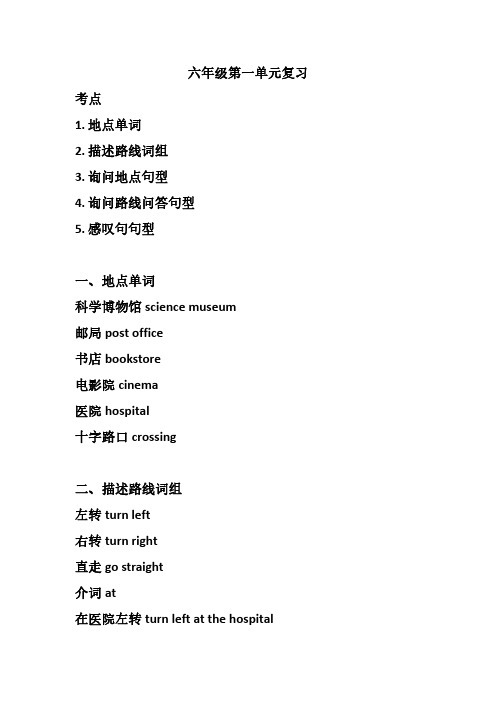
六年级第一单元复习考点1.地点单词2.描述路线词组3.询问地点句型4.询问路线问答句型5.感叹句句型一、地点单词科学博物馆science museum邮局post office书店bookstore电影院cinema医院hospital十字路口crossing二、描述路线词组左转turn left右转turn right直走go straight介词at在医院左转turn left at the hospital在邮局左转turn left at the post office在书店右转turn right at the bookstore在电影院右转turn right at the cinema在十字路口直走go straight at the crossing二、询问地点句型句型问:Where is+地点?答:It's+方位介词+地点.1.医院在哪?在电影院旁边。
Where is the hospital?It’s near the cinema.2.电影院在哪?紧挨着科学博物馆。
Where is the cinema?It’s next to the science museum.3.书店在哪?在邮局的前面。
Where is the bookstore?It’s in front of the post office.三、询问路线句型句型问:How can+主语+get there?How can+主语+get to+地点?答:Turn right/Turn left/go straight+at+地点.1.我们如何到达那儿?How can we get there?2.我如何到达那儿?How can I get there?3.我如何到科学博物馆?How can I get to the science museum?4.我如何到学校?How can I get to school?5.我们如何到达电影院?How can we get to the cinema?6.我们如何到达邮局?How can we get to the post office? 7.我们如何到家?How can we get home?四、感叹句句型句型结构What a/an+形容词+名词!1.多么有趣的电影啊!What an interesting film!2.多么棒的博物馆啊!What a great museum!3.多么漂亮的房间呀!What a nice room!。
六年级上册英语试题--期末基础知识复习--句型练习 人教PEP版(含答案)
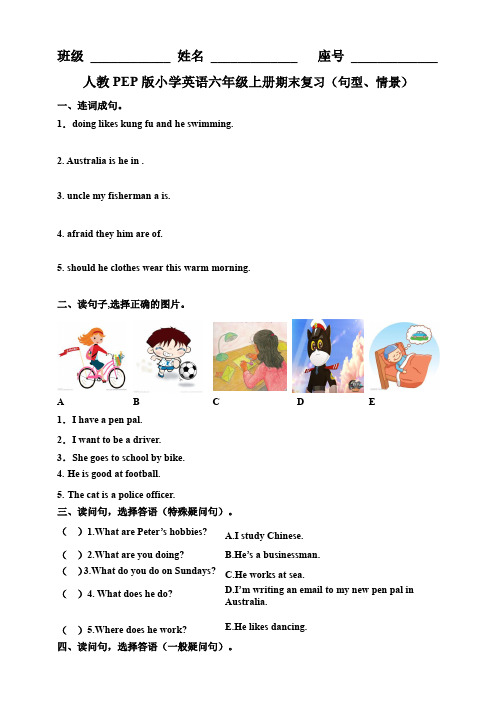
班级 ____________ 姓名 _____________ 座号 _____________人教PEP 版小学英语六年级上册期末复习(句型、情景)一、连词成句。
1.doing likes kung fu and he swimming.2. Australia is he in .3. uncle my fisherman a is.4. afraid they him are of.5. should he clothes wear this warm morning.二、读句子,选择正确的图片。
ABCDE三、读问句,选择答语(特殊疑问句)。
四、读问句,选择答语(一般疑问句)。
1.I have a pen pal. 2.I want to be a driver. 3.She goes to school by bike. 4. He is good at football. 5. The cat is a police officer.( )1.What are Peter’s hobbies? A.I study Chinese. ( )2.What are you doing?B.He’s a businessman.( )3.What do you do on Sundays? C.He works at sea. ( )4. What does he do?D.I’m writing an email to my new pen pal in Australia.( )5.Where does he work?E.He likes dancing.()1. Do you want to be a head teacher, too? A.No, he isn’t. ()2. Is your father here today? B.No, he doesn’t.()3. Does he like doing word puzzles and going hiking? C.Cool!()4.Shall we dance? D.No, I don’t. ()5.Can I also be his pen pal? E.Sure. Why not?五、按照要求完成句子(对划线部分提问)。
人教版六年级英语下册各单元必背词汇和句型
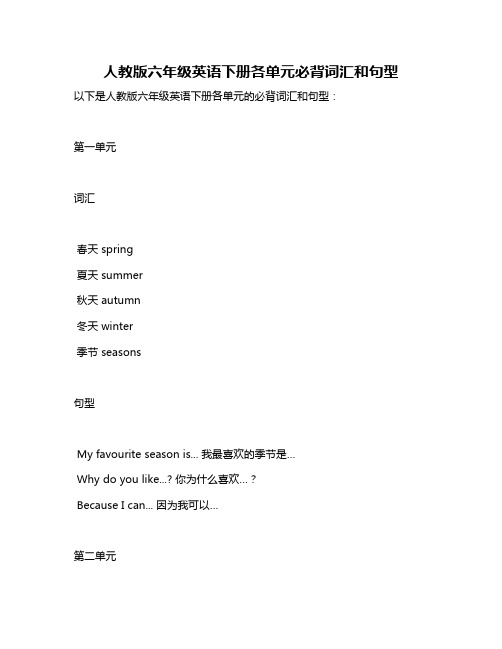
人教版六年级英语下册各单元必背词汇和句型以下是人教版六年级英语下册各单元的必背词汇和句型:第一单元词汇春天 spring夏天 summer秋天 autumn冬天 winter季节 seasons句型My favourite season is... 我最喜欢的季节是…Why do you like...? 你为什么喜欢…?Because I can... 因为我可以…第二单元词汇游泳 swim滑冰 skate放风筝 fly a kite堆雪人 make a snowman季节活动 seasonal activities句型What do you do in the...? 你在…做什么?I usually... 我通常…Do you often...? 你经常…吗?Yes, I do. / No, I don’t. 是的,我经常。
/ 不,我不经常。
第三单元词汇星期一 Monday星期二 Tuesday星期三 Wednesday星期四 Thursday星期五 Friday星期六 Saturday星期日 Sunday星期 weekdays星期天 weekends句型What do you have on...? 你星期几有什么课?I have... 我星期几有…课。
When do you have...? 你什么时候有…课? I have... on... 我在星期几有…课。
第四单元词汇电影 movies公园 parks图书馆 libraries博物馆 museums商店 shops饭店 restaurants医院 hospitals学校 schools银行 banks邮局 post offices公共场所 public places 句型。
人教版 小学英语六年级下册总复习资料
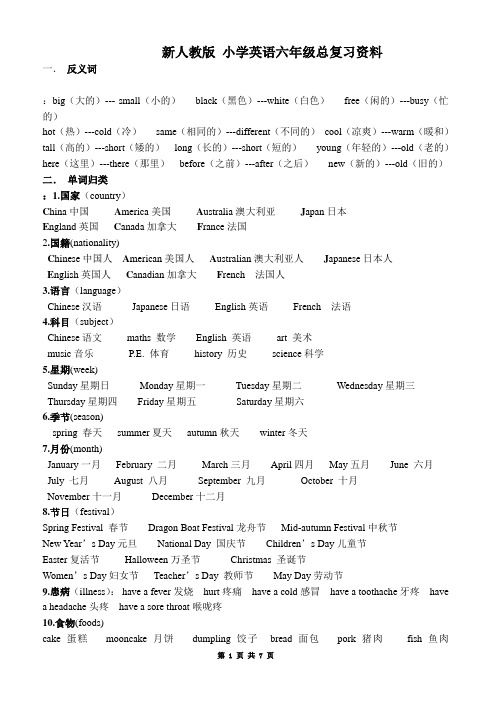
新人教版小学英语六年级总复习资料一.反义词:big(大的)--- small(小的)black(黑色)---white(白色)free(闲的)---busy(忙的)hot(热)---cold(冷)same(相同的)---different(不同的)cool(凉爽)---warm(暖和)tall(高的)---short(矮的)long(长的)---short(短的)young(年轻的)---old(老的)here(这里)---there(那里)before(之前)---after(之后)new(新的)---old(旧的)二.单词归类:1.国家(country)C hina中国A merica美国A ustralia澳大利亚J apan日本E ngland英国C anada加拿大F rance法国2.国籍(nationality)C hinese中国人A merican美国人A ustralian澳大利亚人J apanese日本人E nglish英国人C anadian加拿大F rench 法国人3.语言(language)Chinese汉语Japanese日语English英语French 法语4.科目(subject)Chinese语文maths 数学English 英语art 美术music音乐P.E. 体育history 历史science科学5.星期(week)Sunday星期日Monday星期一Tuesday星期二Wednesday星期三Thursday星期四Friday星期五Saturday星期六6.季节(season)spring 春天summer夏天autumn秋天winter冬天7.月份(month)January一月February 二月March三月April四月May五月June 六月July 七月August 八月September 九月October 十月November十一月December十二月8.节日(festival)Spring Festival 春节Dragon Boat Festival龙舟节Mid-autumn Festival中秋节New Year’s Day元旦National Day 国庆节Children’s Day儿童节Easter复活节Halloween万圣节Christmas 圣诞节Women’s Day妇女节Teacher’s Day 教师节May Day劳动节9.患病(illness): have a fever发烧hurt疼痛have a cold感冒have a toothache牙疼havea headache头疼have a sore throat喉咙疼10.食物(foods)cake蛋糕mooncake月饼dumpling 饺子bread 面包pork猪肉fish鱼肉chicken 鸡肉meat肉egg鸡蛋sandwich三文治pizza 比萨饼hamburger 汉堡包noodles 面条11.时间(time)year年month 月week周date日期day 白天hour 小时morning早上afternoon下午evening晚上yesterday昨天today今天tomorrow明天last year去年12.服装(clothes)T-shirt T恤衫sweater毛衣coat 大衣shorts短裤jeans牛仔裤hat帽子cap帽子shoe鞋子sock 短袜13.动物(animals)chicken鸡duck鸭goose鹅dog狗cat 猫pig猪sheep绵羊goat 山羊horse马lion狮子tiger老虎elephant 大象snake蛇kangaroo 袋鼠monkey 猴子bear 熊panda熊猫whale鲸frog青蛙mouse老鼠giraffe长颈鹿deer鹿14.颜色(colour)grey 灰色red红色green绿色yellow黄色blue蓝色white白色black黑色pink粉红色orange橙色brown褐色purple紫色15.饮料(drinks)juice汁milk 牛奶coke可乐tea茶coffee 咖啡soup 汤16.数字基数词:one 一two 二three三four四five五six 六seven七eight八nine 九ten十eleven 十一twelve 十二thirteen 十三fifteen十五twenty二十thirty 三十forty 四十fifty五十hundred 百thousand 千million百万序数词:first 第一second第二third第三fifth第五sixth第六seventh第七eighth第八ninth第九twelfth 第十二twentieth 第二十thirtieth第三十17.植物、水果tree 树flower花seed种子grass草vegetable蔬菜tomato西红柿potato马铃薯fruit 水果apple苹果pear 梨orange橙banana 香蕉grape葡萄peach桃子18.职业(jobs)worker工人farmer农民soldier士兵doctor医生nurse护士teacher 教师driver司机cook厨师policeman警察19、自然界sun太阳moon月亮star星星sky天空river江河lake 湖sea大海hill山mountain山脉snow雪wind风cloud云rain雨20、天气(weather)sunny阳光明媚的windy有风的cloudy多云的snowy下雪的rainy下雨的dry干燥的wet湿的warm暖的cool凉爽的cold冷的hot热的21、人体部分head头hair头发hand手face脸eye眼ear耳朵nose鼻子leg腿foot脚22、人people人们man男人woman妇女child小孩grandparent祖父母parent父母father父亲mother母亲sister姐妹brother兄弟cousin堂兄uncle舅舅、叔叔23、文具pen钢笔pencil铅笔rubber橡皮ruler尺knife小刀map地图dictionary字典24、建筑与房屋部分bedroom卧室living-room客厅kitchen厨房garden花园office办公室bank银行school学校hospital医院cinema电影院park公园park动物园shop商店bookstore书店post office邮局TV station电视台hotel宾馆wall墙floor 地板window 窗door门25.日用品camera 照相机telephone电话clock钟lamp灯fridge冰箱cup杯glass玻璃杯box盒子bowl碗26.方向left左right右east东south南west西north北27.家具bed床desk书桌table桌子chair椅子shelf架子28.餐食meal一顿饭breakfast早餐lunch 午餐dinner晚餐29.交通工具bus公共汽车train火车car小汽车bike自行ship轮船boat小船plane飞机30.外貌tall高的short矮的fat胖的healthy健康的good-looking 好看的beautiful美丽的strong强壮的old 老的young 年轻的heavy重的四.动词词组go shopping去购物go fishing去钓鱼go boating去划船go swimming 去游泳go skiing 去滑雪go skating去溜冰go for a walk 去散步go to the cinema 去看电影go to bed去睡觉go to school去上学go to work去上班go back回来go out出去play football 踢足球play basketball打篮球play table tennis打乒乓球play badminton 打羽毛球play the piano 弹钢琴play games玩游戏write a letter写信listen to music听音乐watch TV 看电视see a film 看电影take photos照相clean the room打扫房间wash clothes洗衣服draw a picture画画have breakfast 吃早餐have lunch 吃午餐have dinner 吃晚饭do housework 做家务do my homework做作业have a Chinese lesson 上语文课take a message传递信息turn on打开take exercise锻炼take medicine服药take photos照相plant trees种树pick up捡起wait for等候五.介词短语a pair of 一双 a lot of 许多on the farm在农场in front of在…前面in the sky 在空中look for寻找put on穿上wait for等待wake up醒来on foot步行in the morning 在早上in the afternoon在下午in the evening在晚上at night在晚上at school 在学校at home在家六、易错词汇1. a, an的选择: 元音字母开头的单词用an,辅音字母开头的单词用a.2. am , is , are的选择: 单数用is , 复数用are. I 用am , you 用are.3. have , has 的选择: 表示某人有某物。
人教精通版小学英语六年级上册单文句型
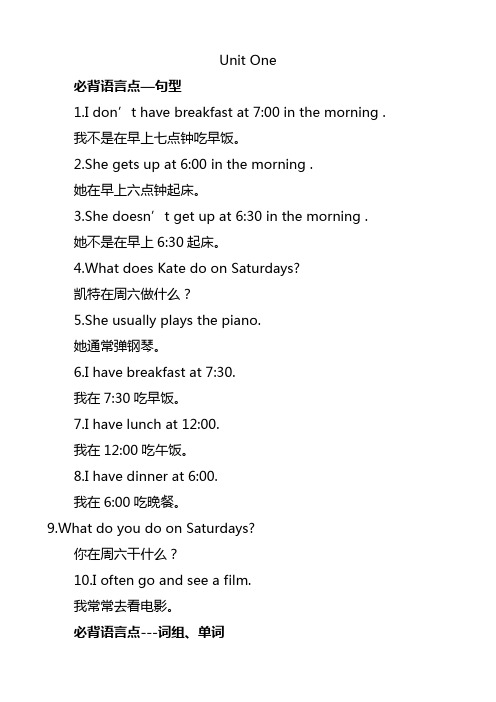
Unit One必背语言点—句型1.I don’t have breakfast at 7:00 in the morning .我不是在早上七点钟吃早饭。
2.She gets up at 6:00 in the morning .她在早上六点钟起床。
3.She doesn’t get up at 6:30 in the morning .她不是在早上6:30起床。
4.What does Kate do on Saturdays?凯特在周六做什么?5.She usually plays the piano.她通常弹钢琴。
6.I have breakfast at 7:30.我在7:30吃早饭。
7.I have lunch at 12:00.我在12:00吃午饭。
8.I have dinner at 6:00.我在6:00吃晚餐。
9.What do you do on Saturdays?你在周六干什么?10.I often go and see a film.我常常去看电影。
必背语言点---词组、单词1.get up 起床2.go to school 上学3.School begins.上课。
4.School is over. 下学。
5.go home 回家6.watch TV看电视7.go to bed 睡觉8.cook breakfast 做早饭9.teach English 教英语10.take a walk 散步11.read stories读故事12play the piano 弹钢琴13.have breakfast吃早饭14.lunch 午饭15.dinner 晚餐16.walk 步行17.every 每一18.morning 早上,上午19.afternoon 下午20.evening晚上21.often 常常22.see a film 看电影23.clean the window/door/floor 擦窗户/门/地板24.easy 容易的25.difficult 困难的Unit Two必背语言点—句型1.What’s your grandpa’s hobby?你爷爷的爱好是什么?2.His hobby is fishing .他的爱好是钓鱼。
人教版PEP小学英语六年级上册重点句型及语法知识汇总

人教版PEP小学英语六年级上册重点句型及语法知识汇总Unit 1 How can I get there?重点单词XXX。
post office邮局,XXX。
XXX。
XXX。
crossing十字路口。
turn left左转。
turn right右转。
gostraight直走。
map地图。
compass指南针。
GPS全球定位系统。
stars星星。
XXX意大利餐厅。
getto到达。
重点句型1.---Where is the restaurant?餐厅在哪里?It’s next to the park on Dong fang Street.它在东方路,在公园附近。
2.---How can we get there?我们怎么去哪里?XXX left XXX.书店左转,然后病院右转。
3.He now has GPS.他现在有GPS。
4.What an interesting film!何等风趣的片子!方位词复:XXX紧挨着,near在。
邻近,XXX在。
背面,XXX在。
旁边,in front of在。
前面。
Unit 2 Ways to go to school重点单词on foot走路。
by bike骑车。
by bus乘公交。
by train乘火车。
XXX乘地铁。
by ship搭船。
by XXX乘飞机。
slow down 慢下来。
XXX交通灯。
traffic rules交通划定规矩。
go/come to school上学。
by sled坐雪橇。
byferry坐轮渡。
pay n to留意。
traffic lights交通灯。
and wait at a red light红灯停等一等。
slow downand。
at a yellow light黄灯减速并停下。
Go XXX。
重点句型1.---How do you come to school?你怎么上学?----Usually。
I come on foot.通常我走路来的。
小学人教版六年级英语上册复习要点

六年级上册复习要点Unit1HowcanIgetthere?一、重点单词:地点:sciencemuseum科学博物馆postoffice邮局bookstore书店cinema 电影院hospital 医院动作:gostraight直走turnleft/right 左转、右转方位:infront of:在···前面behind在···后面near在⋯旁边nextto紧挨着beside在旁边over在⋯上方ontheleft在左边ontheright在右边二、重点句型:(1)Is/Arethere⋯?某处有某物吗?肯定回答:Yes,thereis/are.否定回答:No,thereisn’t/aren’t. (2)Whereisthe+ 地点?...... 在哪里?It’s+ 表示地点的名词. 它......例句:Whereisthecinema?电影院在哪?It’snexttothebookstore.在书店的旁边。
(3)Howcan+主语+get(to)+地点?......怎么到......?(如果get后面接的词为副词,则要省略介词to.)例句:Howcanwegettothepark?Howcanwegetthere?我们怎么到那儿?同义句型:Canyoutellmethewayto+地点?(4)Whereis+地点?Whichisthewayto+地点?(5)Turnleftatthebookstore.到书店左转。
Unit2Waystogotoschool?一、重点单词/短语:交通方式:bybike/bus/plane/subway/train/ship/taxi/ferry骑自行车/乘公共汽车/飞机/地铁/火车/船/出租汽车/轮渡taketheNo.57bus乘57路公共汽车onfoot 步行其他:slowdown 慢下来payattentionto 注意trafficlights 交通信号灯lookright 向右看crosstheroad横穿马路athome 在家二、重点句型:(1)Howdoyou come(to)+地点?你们怎么来...的?I usually/often/sometimes.....我通常/经常/有时...Howdoyou go(to)+地点?你们怎么去...的?Howdoyou get(to)+地点?你们怎么到达...的?(频度副词:频度副词又称频率副词,用来表示事情发生的频率,即某事多长时间发生一次。
小学六年级英语(上册)知识归纳|人教版 笔记 重点
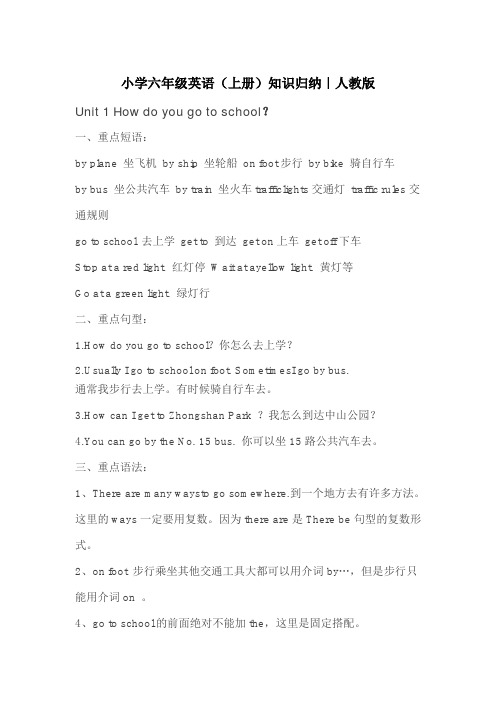
小学六年级英语(上册)知识归纳|人教版Unit 1 How do you go to school?一、重点短语:by plane 坐飞机by ship 坐轮船on foot步行by bike 骑自行车by bus 坐公共汽车by train 坐火车trafficlights交通灯traffic rules交通规则go to school 去上学get to 到达get on上车get off下车Stop at a red light. 红灯停Wait at ayellow light. 黄灯等Go at a green light. 绿灯行二、重点句型:1.How do you go to school?你怎么去上学?ually I go to school on foot. SometimesI go by bus.通常我步行去上学。
有时候骑自行车去。
3.How can I get to Zhongshan Park ?我怎么到达中山公园?4.You can go by the No. 15 bus. 你可以坐15路公共汽车去。
三、重点语法:1、There are many waysto go somewhere.到一个地方去有许多方法。
这里的ways一定要用复数。
因为there are是There be句型的复数形式。
2、on foot 步行乘坐其他交通工具大都可以用介词by…,但是步行只能用介词on 。
4、go to school的前面绝对不能加the,这里是固定搭配。
5、USA 和US 都是美国的意思。
另外America也是美国的意思。
6、go to the park 前面一定要加the. 如果要去的地方有具体的名字,就不能再加the ,如果要去的地方没有具体名字,都要在前面加the. (go to school除外。
)7、How do you go to …?你怎样到达某个地方?如果要问的是第三人称单数,则要用:How does he/she…go to …?8、反义词:get on(上车)---get off(下车)near(近的)—far(远的)fast(快的)—slow(慢的)because(因为)—why(为什么)same(相同的)—different(不同的)9、近义词:see you---goodbye sure---certainly---ofcourse10、频度副词:always 总是,一直usually 通常often经常sometimes 有时候never 从来不Unit 2 Where is the science museum?一、重点短语:library 图书馆post office 邮局hospital医院cinema 电影院bookstore书店science museum科学博物馆turnleft向左转turn right 向右转go straight 直行north北south南east东west西next to靠近、与……。
(完整版)小学六年级人教版英语总复习及知识点
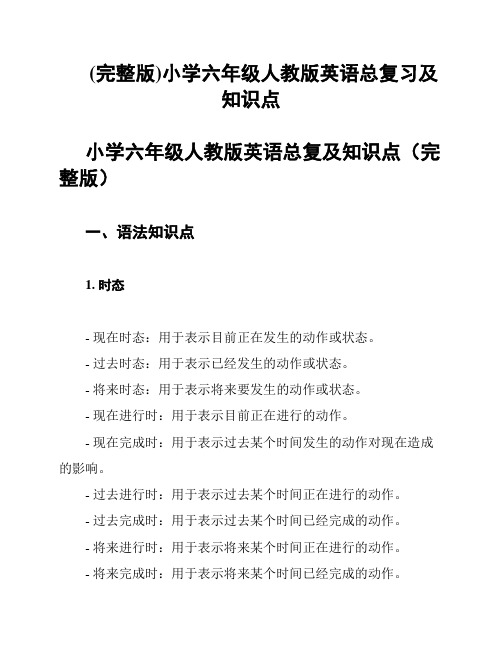
(完整版)小学六年级人教版英语总复习及知识点小学六年级人教版英语总复及知识点(完整版)一、语法知识点1. 时态- 现在时态:用于表示目前正在发生的动作或状态。
- 过去时态:用于表示已经发生的动作或状态。
- 将来时态:用于表示将来要发生的动作或状态。
- 现在进行时:用于表示目前正在进行的动作。
- 现在完成时:用于表示过去某个时间发生的动作对现在造成的影响。
- 过去进行时:用于表示过去某个时间正在进行的动作。
- 过去完成时:用于表示过去某个时间已经完成的动作。
- 将来进行时:用于表示将来某个时间正在进行的动作。
- 将来完成时:用于表示将来某个时间已经完成的动作。
2. 语法结构- 名词:用于表示人、动物、物体、地点等。
- 动词:用于表示动作或状态。
- 形容词:用于描述名词的特征或状态。
- 副词:用于修饰动词、形容词或其他副词。
- 介词:用于表示位置、时间或关系等。
- 代词:用于替代名词。
- 数词:用于表示数量。
- 冠词:用于限定名词的范围。
- 连词:用于连接词语、短语或句子。
3. 句子结构- 主语:句子中执行动作或承受动作的人或事物。
- 谓语:句子中说明主语动作或状态的部分。
- 宾语:句子中接受动作的人或事物。
- 定语:用于修饰名词或代词的成分。
- 状语:用于修饰动词、形容词、副词或整个句子的成分。
- 表语:用于说明主语的状态或特征的部分。
二、总复内容1. 单词- 请根据教材中的单词表,复并牢记相关的单词拼写和意思。
2. 句子- 复教材中的对话和句子,理解并掌握其基本意思和用法。
3. 对话- 复教材中的对话,掌握其中的日常生活用语和表达方式。
4. 语法- 复教材中的语法知识点,加深对时态、语法结构和句子成分的理解。
三、研究方法1. 多听多说- 多听英语教材、歌曲或英语广播,提高听力水平。
- 多说英语,练口语表达和语音准确性。
2. 多读多写- 多读英语教材、故事书等,提高阅读理解能力。
- 多写英语作文,锻炼自己的写作能力和语法运用。
最新人教版小学英语六年级上册知识要点复习

人教版(PEP)小学英语总复习六年级上册知识点Unit 1 How can I get there ?一、主要单词:museum博物馆bookstore书店cinema电影院turn 转弯hospital医院left向左postoffice 邮局science科学right向右straight笔直地crossing十字路口二、习惯语搭配:postoffice邮局science museum科学博物馆pet hospital宠物医院Italian restaurant意大利餐馆gostraight直走turnright/left右/左转next to紧挨着nearthe park在公园附近in front of...在...前面on Dongfang Street在东方大街上三、惯用表达式:Excuse me.打扰一下。
Follow me,please!请跟着我!四、句型:1、问路的句型及其答语:问句:Where is the+ 地点?···在哪儿?2、询问怎么到某地的句型及其答语:问句:Howcan+主语+get (to)+地点?···怎么到···?例句:How canI get to ZhongShan park?How can I get there?同义句型:Canyou tell methe way to+地点?Where is+ 地点?Whichis the way to +地点?五、例句:Where is the museumshop? 博物馆在哪里?It’s near the door. 在大门附近。
How can we getthere?我们怎么到那儿?Turn left at thebookstore。
到书店左转。
六、主题写作:范文How to Get to the Science MuseumWe are going tothescience museum tomorrow.The science museumis nexttothe hospital.It’s notfarfrom ourschool.Sowe can go there on foot.First,gostraightfromour school.Next,turn left atthe post officeand walk for about five minutes.Then turnright at the bookstor e.We canfindthe hospitalon the right.Walkstraight,andwe’ll see the science museum.Unit 2Ways togo to school一、主要单词:by乘bus公共汽车on foot步行plane飞机taxi出租车ship(大)船subway地铁t rain火车slow慢的stop停下 always 总是,一直usua lly通常often经常sometimes有时候 never 从来不二、习惯语搭配:by bike/bus/plane/subway/train/ship/taxi/ferry/boat骑自行车/乘公共汽车/飞机/地铁/火车/船/出租汽车/渡轮/小船takethe No.57 bus乘57路公共汽车on foot步行slowdown 慢下来pay attention to注意traffic lights交通信号灯at home在家get to到达be far from…表示离某地远三、惯用表达式:Go at a green light.绿灯行。
最新人教版小学英语六年级上册期末复习知识点总结(全册)

最新人教版小学英语六年级上册期末复习知识点总结(全册)Unit 1Vocabulary- Greetings: hello, hi, good morning, good afternoon, good evening - Countries and nationalities: America, England, China, Japan, Mexico, Australia, Russian- Numbers: 1-20Grammar- Be verb (am, is, are): subject pronouns (I, you, he, she, it, we, they) - Question words: what, where, who, how- Plural nounsUnit 2Vocabulary- Sports: soccer, baseball, basketball, table tennis, swimming- Colors: red, green, blue, yellow, white, black, pink, purpleGrammar- Present continuous tense (am/is/are + verb + ing)- Demonstrative pronouns (this, that, these, those)Unit 3Vocabulary- Subjects: math, English, Chinese, science, music, art, P.E.- School items: pens, pencils, books, rulers, erasers, pencil cases, backpacksGrammar- Can (ability): affirmative, negative, and interrogative forms- Frequency adverbs: always, usually, sometimes, neverUnit 4Vocabulary- Food: bread, noodles, eggs, rice, dumplings, ice cream- Fruits: apples, bananas, oranges, grapes, strawberries, watermelonsGrammar- Countable and uncountable nouns- How much (asking about quantity for uncountable nouns)- How many (asking about quantity for countable nouns)Unit 5Vocabulary- Weather: sunny, cloudy, windy, rainy, snowy- Seasons: spring, summer, autumn, winterGrammar- Simple present tense: affirmative/negative/interrogative forms - Adverbs of frequency: always, usually, sometimes, neverUnit 6Vocabulary- Animals: cat, dog, rabbit, duck, mouse, bird, monkey- Body parts: head, eye, nose, mouth, ear, hand, footGrammar- There be (there is/there are): affirmative/negative/interrogative forms- Possessive 's: showing ownershipUnit 7Vocabulary- Occupations: teacher, doctor, driver, cook, police officer, singer, dancer- Rooms: living room, bedroom, bathroom, kitchenGrammar- Simple present tense: affirmative/negative/interrogative forms- Prepositions of place: in, on, under, behind, in front ofUnit 8Vocabulary- Transportation: bike, car, bus, train, subway, plane- Directions: left, right, forward, backwardGrammar- Imperative sentencesThis is a summary of key vocabulary and grammar points from each unit in the textbook. Happy studying and good luck on your exams!。
小学人教PEP英语六年级上册重点单词、短语、句型汇总
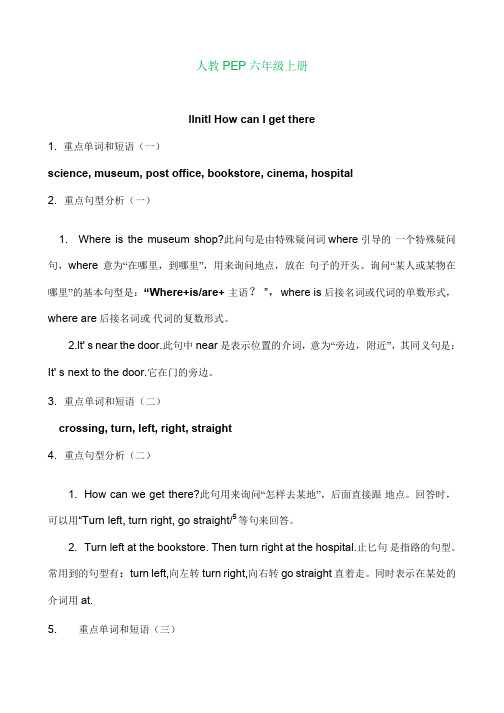
人教PEP六年级上册llnitl How can I get there1. 重点单词和短语(一)science, museum, post office, bookstore, cinema, hospital2. 重点句型分析(一)1. Where is the museum shop?此问句是由特殊疑问词where引导的一个特殊疑问句,where意为“在哪里,到哪里”,用来询问地点,放在句子的开头。
询问“某人或某物在哪里”的基本句型是:“Where+is/are+ 主语?”,where is后接名词或代词的单数形式,where are后接名词或代词的复数形式。
2.lt' s near the door.此句中near是表示位置的介词,意为“旁边,附近”,其同义句是:It' s next to the door.它在门的旁边。
3. 重点单词和短语(二)crossing, turn, left, right, straight4. 重点句型分析(二)1. How can we get there?此句用来询问“怎样去某地”,后面直接跟地点。
回答时,可以用“Turn left, turn right, go straight/5等句来回答。
2. Turn left at the bookstore. Then turn right at the hospital.止匕句是指路的句型。
常用到的句型有:turn left,向左转turn right,向右转go straight直着走。
同时表示在某处的介词用at.5. 重点单词和短语(三)Tasty, buy, London Eye, next to, far from, go straight, turn left, stomach 6. 重点句型分析(三)Is the Thames far from here? No.此句是个be动词开头的一般疑问句,其回答要用yes或no.句中的far from意为“离 ............................................. 远”。
人教版小学英语三至六年级重点句型

1.-- Hello. 你好。
--Hi.你好。
2.-What’s your name 你叫什么名字?-My name’. John.我叫约翰。
4、3.-Goodbye! 再见!5、-Bye, Miss White.再见。
6、-Good morning.早上好。
7、Good afternoon.下午好。
6. Nice to meet you.见到你很高兴。
-Nice to meet you, too.见到你也很高兴。
8、7.、--How are you你好吗?9、--I’m fine, thank you.我很好, 谢谢你。
10、Very well, thanks.很好, 谢谢。
--What’s this这是什么?/ What’s that那是什么?-- It’s a duck.(它)是只鸭子。
9 --I’ d like some juice, please.请给我些果汁。
Can I have some water, please请给我些水好吗?--Here you are.给你。
10. You’re welcome.不用谢、Happy birthday!生日快乐!12--How old are you你几岁(了)?-- I’m six years old.我六岁(了)。
1.--Where are you from?你是哪里人?-- I’m from the UK.我是英国人。
2.--Who’s that man 那位男士是谁?--He’s my father. 他是我爸爸。
3.--Who’s that woman 那位女士是谁?--She’s my mother. 她是我妈妈。
4.--Is she your mother 她是你的妈妈吗?--Yes, she is. 是的, 她是。
5.--Is he your father 他是你的爸爸吗?--No.he isn’t.不,他不是。
6、--Where is my pencil box 我的铅笔盒在哪里?--It’s in your desk.在你桌子里。
人教版小学英语六年级上册重点语法
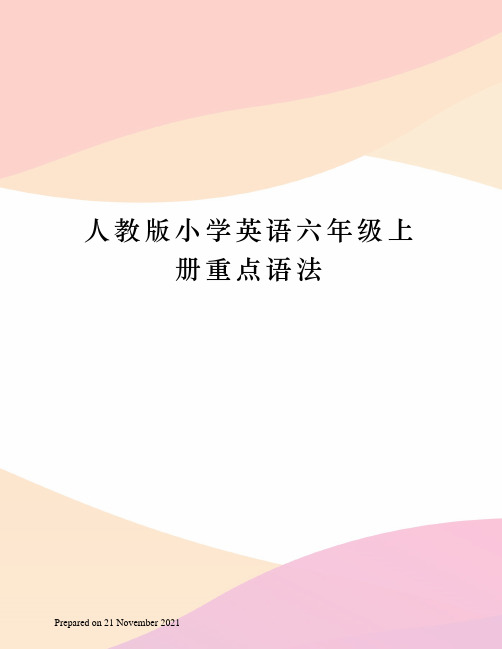
人教版小学英语六年级上册重点语法Prepared on 21 November 2021P E P小学英语六年级上册语法总复习。
一、第三人称单数He 、She、It 后面的动词要加s或es1.一般情况加s,如:read—reads;live—lives;play—plays;sing—sings2.动词末尾以s,x,ch,sh或部分以o结尾的加es。
(记住课本中出现的这几个:watches, teaches, goes, does, washes, passes)3.辅音字母+y结尾的把y变i再加es,如:fly—flies;study—studies4.特殊情况:have--has5.第三人称单数包括:he; she; it; my father/friend; Amy/Hangzhou等一个人名或地名。
例如:He?likes drawing pictures. She?works in a car company.It?comes from the clouds. My fathergoes to work on foot.Li Lei?often plays computer games after lunch.6.一般疑问句记住:前面助动词加了es,后面动词就不变化了。
例如: DoessheteachEnglish Doesyour pen pallivein Hangzhou二、不定冠词a和an的用法a用于辅音因素开头的单词前; an用于元音因素开头的单词前。
(a,e,i,o,u)记住课本中出现的要用an的单词:an actor;an actress;an artist;an engineer;an accountant;an English book;an orange;an apple;an old woman三、动词变化为表示职业或人的单词1.动词后面加er:work—worker;teach—teacher;sing—singer;TV report—TV reporterclean—cleaner2.动词后面加or:act—actor;doctor3.末尾以e结尾的直接加r:write—writer;dance—dancer;drive—driver4.动词后面加ist:art—artist;tour—tourist5.职业男女有区别的:警察policeman—policewoman;演员actor—actress四、8个疑问词which 哪一个what 什么when 什么时候where 哪里 whose 谁的why 为什么how 怎么样who 谁五、人称代词和物主代词I—my(我—我的)you—your(你;你们—你的;你们的)he—his(他—他的)she—her(她—她的)we—our(我们—我们的)they—their(他们/她们/它们—他们的/她们的/它们的)八、can后面加动词原形 What can you do? I can cook the meals. He can fly kites. She can play the violin.。
人教版小学六年级英语上册知识点总结和复习要点
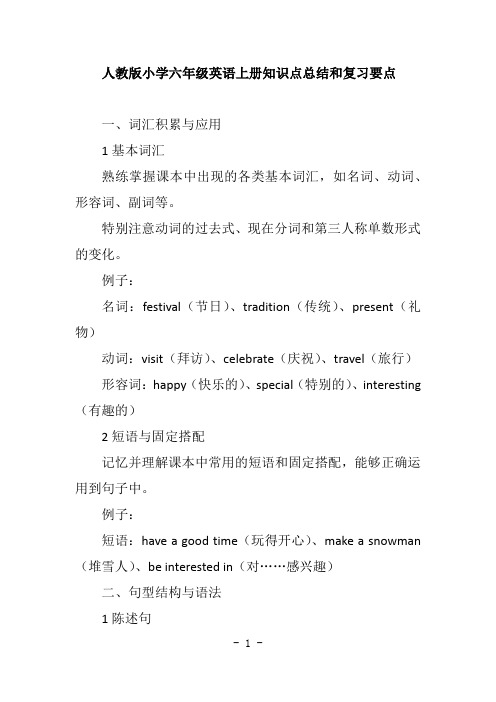
人教版小学六年级英语上册知识点总结和复习要点一、词汇积累与应用1基本词汇熟练掌握课本中出现的各类基本词汇,如名词、动词、形容词、副词等。
特别注意动词的过去式、现在分词和第三人称单数形式的变化。
例子:名词:festival(节日)、tradition(传统)、present(礼物)动词:visit(拜访)、celebrate(庆祝)、travel(旅行)形容词:happy(快乐的)、special(特别的)、interesting (有趣的)2短语与固定搭配记忆并理解课本中常用的短语和固定搭配,能够正确运用到句子中。
例子:短语:have a good time(玩得开心)、make a snowman (堆雪人)、be interested in(对……感兴趣)二、句型结构与语法1陈述句复习并巩固陈述句的基本结构,能够正确构建和表达完整的句子。
例子:陈述句:I like playing football in the afternoon.(我喜欢下午踢足球。
)2疑问句学习和掌握特殊疑问句、一般疑问句及其回答方式,能够准确理解并回答问题。
例子:特殊疑问句:What do you usually do on your birthday?(你生日通常做什么?)回答:I usually have a birthday party with my friends.(我通常和朋友们一起举办生日派对。
)3祈使句巩固祈使句的基本用法,能够正确使用祈使句表达请求、命令或建议。
例子:祈使句:Please don’t forget to bring your homework tomorrow.(请别忘了明天带作业来。
)4时态复习并巩固一般现在时、一般过去时、一般将来时和现在进行时等时态的基本用法和形式。
例子:一般现在时:She often reads books after dinner.(她晚饭后经常看书。
)一般过去时:We went to the zoo last weekend and saw many animals.(我们上周末去了动物园,看到了很多动物。
小学六年级人教版上册英语句型转换复习专项题

小学六年级人教版上册英语句型转换复习专项题班级:_____________ 姓名:_____________【句型转换】1. 按要求完成下列各题。
1. going, film, we, to, are, a, about ,travel, see, space (.)(连词成句)2. I’m going to go to the supermarket this evening.(对句子主题意思提问)3.My best friend is Amy. (对句子主题意思提问)4.I like reading stories. I also like singing.(合成一句话)5.Sarah likes listening to music.(改为否定句)2. 句型转换。
1. Tom put books on the shelf yesterday( 改成否定句)2. Helen is going to bring some toys to the party. (对句子主题意思提问)3. He came here last month.(改为否定句)He ________ _________ here last month.4. Mingming read books last night. (对句子主题意思提问)5. He did his homework late last night. (改为一般疑问句)3. 根据要求改写句子。
1. John has lunch at school every day.(对句子主题意思提问)2. Lingling gets up at six o’clock.(现在进行时)3.. I like the small apple.(否定句)4. That tall man is Mr White.(对句子主题意思提问)5. What time do you go to school?(—般过去时)4. 按要求改写下列句子,每空只填一词。
- 1、下载文档前请自行甄别文档内容的完整性,平台不提供额外的编辑、内容补充、找答案等附加服务。
- 2、"仅部分预览"的文档,不可在线预览部分如存在完整性等问题,可反馈申请退款(可完整预览的文档不适用该条件!)。
- 3、如文档侵犯您的权益,请联系客服反馈,我们会尽快为您处理(人工客服工作时间:9:00-18:30)。
1.您叫什么名字?What’s your name?我叫Mike、I’m Mike、My name’s Mike、她叫什么名字?What’s his name?她叫Mike、His name’s Mike、2、我有一本书,我也有。
I have a book、Me too、3、打招呼: Good morning!(早上好) 14很高兴认识您!)4、您(身体)好不?How are you?我很好,谢谢!I’m fine, thank you、Very well, thanks、5、瞧,我有一只兔子。
Look! I have a rabbit、6、我可以瞧一下不?May I have a look?当然可以,给您。
Sure、Here you are、7、我喜欢吃汉堡。
I like hamburgers、来点薯条吧。
Have some French fries、8、能给我一些鸡肉不?Can I have some chicken?当然可以,给您。
Sure、Here you are、9、谢谢。
不用谢。
Thank you、You’re welcome、10、您几岁了?How old are you?我今年14岁了。
I’m 14 years old、11、有多少蛋糕?How many cakes?只有一个。
One cake、12、您从哪里来?Where are you from?我来自中国。
I’m from China、13、那个男人就是谁?Who’s that man?她就是我爸爸。
He’s my father、这就是我爸爸。
This is my father、那个女人就是谁?Who’s that woman?她就是我妈妈。
She’s my mother、这就是我妈妈。
This is my mother、这个男孩就是谁?Who’s this boy?她就是我弟弟。
He’s my brother、这个女孩就是谁?Who’s this girl?她就是我妹妹。
She’s my sister、14、您能瞧到多少只风筝?How many kites can you see?11只。
11、您有多少支蜡笔?How many crayons do you have?16支。
16、15、您喜欢吃梨不?Do you like peaches?就是的,我喜欢。
Yes, I do、不,我不喜欢。
No, I don’t、16、我的玩具汽车在哪里?Where is my car?它在椅子下面。
It’s under the chair、17、对不起,打扰一下。
Excuse me、我能用下您的铅笔不?Can I use your pencil?没问题。
No problem、18、瞧这只大象。
Look at the elephant、它有长长的鼻子与短短的尾巴。
It has a long nose and a short tail、19、它就是什么颜色的? What color is it?它就是红色的。
It’s red、20、我有一个朋友。
I have a friend、她有黑色的短发与一双大眼睛。
He has short black hair and big eyes、她很高。
He is tall、她喜欢音乐。
He likes music、21、这就是您的卧室不?Is this your bedroom?就是的。
Yes, it is、不就是。
No, it isn’t、22、钥匙在哪里?Where are the key?她们挂在门上。
They’re in the door、她们在桌子上不?Are they on the table?就是的。
Yes, they are、不就是。
No, they aren’t、23、您喜欢吃什么?What would you like?请给我来点鱼与蔬菜。
I’d like some fish and vegetables, please、24、您家里有多少人?How many people are there in your family?三个。
Three、她们就是谁?Who are they?25、您爸爸就是干什么的?What’s your father?她就是一个医生,她很高,她喜欢运动。
He’s a doctor、He’s tall、He likes sports、26、餐厅在哪里?Where is the canteen?在一楼。
It’s on the first floor、27、这就是您们的图书馆不?Is this your library?就是的。
Yes, it is、不就是。
No, it isn’t、28、那就是您们的美术教室不?Is that your art room?就是的。
Yes, it is、不就是。
No, it isn’t、29、现在几点?What time is it now? 九点。
It’s nine o’clock、该上英语课了。
It’s time for English class、该去学校了。
It’s time to go to school、30、我的短裙在哪里?Where is my skirt?它就是什么颜色的?What color is it?我的袜子在哪里?Where are my socks?31、今天我能穿我的新衬衫不?Can I wear my new shirt today?可以。
Yes, you can、不可以。
No, you can’t、32、北京的天气怎么样?What’s the weather like in Beijing?很凉爽。
It’s cool、33、这件裙子多少钱?How much is this dress?99元。
太贵了。
It’s ninety-nine yuan、It’s too expensive、34、您的牛仔裤多少钱?How much are your jeans?99元。
It’s ninety-nine yuan、35、那些就是什么?What are they? 就是山羊。
They are goats、36、那些就是马不?Are they horses?就是的。
Yes, they are、不就是。
No, they aren’t、37、有多少只奶牛?How many cows are there? 12只。
Twelve、38、您的数学老师就是谁?Who’s your math teacher? 胡老师。
Mr Hu、她瞧上去怎么样?What’s he like?她很高很瘦,还很与蔼。
He’s tall and thin、He’s very kind、39、她很年轻不?Is she young?就是的。
Yes, she is、不就是。
No, she isn’t、40、今天就是星期几?What day is it today? 星期三。
It’s Wednesday、41、星期三您们有什么课呢?What do you have on Wednesdays?有英语课,语文课与数学课。
We have English, Chinese and math、42、星期六您经常做什么?What do you do on Saturdays?我经常瞧书,做作业。
We often read books and do homework、43、中午您想吃什么啊?What would you like for lunch?我想吃鱼与西红柿。
I’d like some fish and tomatoes、44、今天中午吃了什么啊?What do you have for lunch today?茄子与青豆。
I have some eggplant and tomatoes、45、星期五您们吃了什么啊?What do you have for lunch on Fridays?我们吃了西红柿,豆腐与鱼。
We have tomatoes, tofu and fish、46、您最喜欢什么食物?What’s your favorite food?我喜欢鱼, 很可口。
I like fish、It’s tasty、47、您能做什么呢?What can you do?我会扫地,烧饭。
I can sweep the floor and cook the meals、48、您会洗衣服不?Can you wash the clothes?会。
Yes, I can、不会。
No, I can’t、49、衣柜后面有一面镜子。
There is a mirror behind the closet、床旁边有两个床头柜。
There are two end tables near the bed、50、在这个城市里有一个自然公园。
There is a nature park in the city、51、在公园里有一条小河不?Is there a river in the park?有。
Yes, there is、没有。
No, there isn’t、52、在我住的乡村里有许多小房子。
There are many houses in my village、53、在您们村里有许多桥不?Are there any bridges in your village?有。
Yes, there are、没有。
No, there aren’t、54、您什么时候起床的?When do you get up?我通常6:30起床。
I usually get up at 6:30、55、周末您干什么呢?What do you do on the weekend?我经常去购物。
I usually go shopping、56、您最喜欢哪个季节?Which season do you like best?What’s your favorite season?春天。
春天很温暖。
Spring、It’s warm。
57、您为什么喜欢夏天?Why do you like summer?因为我可以在湖里游泳。
Because I can swim in the lake、58、您的生日就是什么时候?When is your birthday?我的生日在五月。
My birthday is in May、/ It’s in May、我的生日就是7月4日。
It’s July 4th、59、她的生日在六月不?就是的。
Is his birthday in June? Yes、日期就是什么时候?What’s date?6月9日。
It’s June 9th、60、我能与您妈妈通电话不?Can I speak to your mom?有电话找您。
